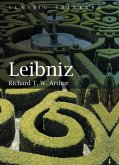Few philosophers have left a legacy like that of Gottfried Wilhelm Leibniz. He has been credited not only with inventing the differential calculus, but also with anticipating the basic ideas of modern logic, information science, and fractal geometry. He made important contributions to such diverse fields as jurisprudence, geology and etymology, while sketching designs for calculating machines, wind pumps, and submarines. But the common presentation of his philosophy as a kind of unworldly idealism is at odds with all this bustling practical activity.
In this book Richard. T. W. Arthur offers a fresh reading of Leibniz's philosophy, clearly situating it in its scientific, political and theological contexts. He argues that Leibniz aimed to provide an improved foundation for the mechanical philosophy based on a new kind of universal language. His contributions to natural philosophy are an integral part of this programme, which his metaphysics, dynamics and organic philosophy were designed to support. Rather than denying that substances really exist in space and time, as the idealist reading proposes, Leibniz sought to provide a deeper understanding of substance and body, and a correct understanding of space as an order of situations and time as an order of successive things.
This lively and approachable book will appeal to students of philosophy, as well as anyone seeking a stimulating introduction to Leibniz s thought and its continuing relevance.
In this book Richard. T. W. Arthur offers a fresh reading of Leibniz's philosophy, clearly situating it in its scientific, political and theological contexts. He argues that Leibniz aimed to provide an improved foundation for the mechanical philosophy based on a new kind of universal language. His contributions to natural philosophy are an integral part of this programme, which his metaphysics, dynamics and organic philosophy were designed to support. Rather than denying that substances really exist in space and time, as the idealist reading proposes, Leibniz sought to provide a deeper understanding of substance and body, and a correct understanding of space as an order of situations and time as an order of successive things.
This lively and approachable book will appeal to students of philosophy, as well as anyone seeking a stimulating introduction to Leibniz s thought and its continuing relevance.
This is a lucid, informative and original book. With marvellous clarity and authority, Arthur paints a very sympathetic and very useful portrait of Leibniz's philosophy, its development and the context in which it develops. Leibniz's scholars will appreciate the original positions it takes and the solid arguments (textual and historical) the author assembles to support them. If you can read only one book about Leibniz's philosophy, read this one.
Ohad Nachtomy, Bar-Ilan University, Israel
An engaging introduction to Leibniz's philosophy. Arthur succeeds in rendering Leibniz's often arcane views accessible to the general reader, while defending an illuminating interpretation of the development and unity of his thought in logic, linguistics, mathematics, physics and metaphysics. A first-class work from a leading Leibniz expert.
Donald Rutherford, University of California, San Diego
Fluently tracing the development of Leibniz's thought, Arthur seamlessly interweaves and unites Leibniz's interests in language, the natural and life sciences, mathematics, law, and religion with a philosophy that endorses the reality of bodies. The result is a fascinating and illuminating account of the man and his thought that not only deepens and enriches our understanding but also bears testimony to the enduring significance of his ideas.
Pauline Phemister, University of Edinburgh
Ohad Nachtomy, Bar-Ilan University, Israel
An engaging introduction to Leibniz's philosophy. Arthur succeeds in rendering Leibniz's often arcane views accessible to the general reader, while defending an illuminating interpretation of the development and unity of his thought in logic, linguistics, mathematics, physics and metaphysics. A first-class work from a leading Leibniz expert.
Donald Rutherford, University of California, San Diego
Fluently tracing the development of Leibniz's thought, Arthur seamlessly interweaves and unites Leibniz's interests in language, the natural and life sciences, mathematics, law, and religion with a philosophy that endorses the reality of bodies. The result is a fascinating and illuminating account of the man and his thought that not only deepens and enriches our understanding but also bears testimony to the enduring significance of his ideas.
Pauline Phemister, University of Edinburgh








